Image
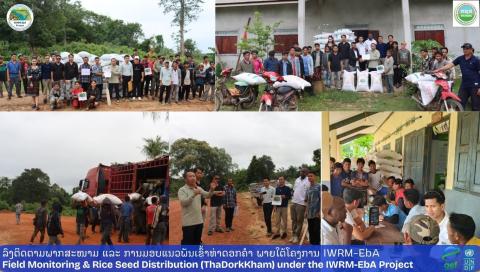
Project Number
Integrated Water Resource Management and Ecosystem-based Adaptation (EbA) in the Xe Bang Hieng River Basin and Luang Prabang City
Project Status
Status 1
Project Date
Project category
Category 1
Project Stage
Stage 1
Project Area of Work
Area of Work 1
Project Donor & Co-financing
Donor 1
Project Contact Details
For media inquiries, please contact:
Phouphet Chittaphone
Database and Communication Officer, IWRM-EbA Project
Department of Water Resources, Ministry of Agriculture and Environment
Email: [email protected] Tel: +8562058562532
Phouphet Chittaphone
Database and Communication Officer, IWRM-EbA Project
Department of Water Resources, Ministry of Agriculture and Environment
Email: [email protected] Tel: +8562058562532
Share:
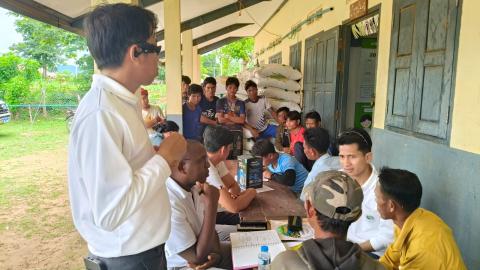
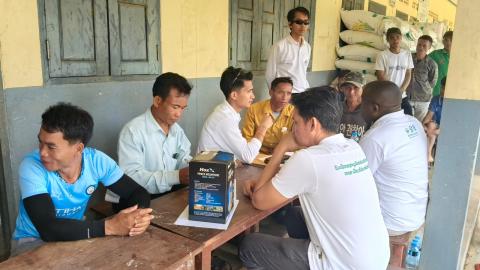
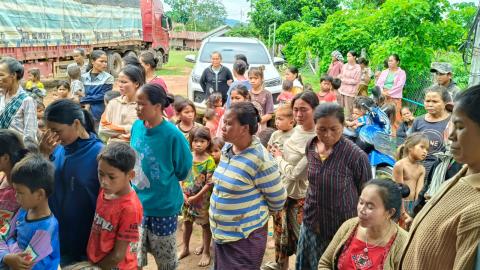
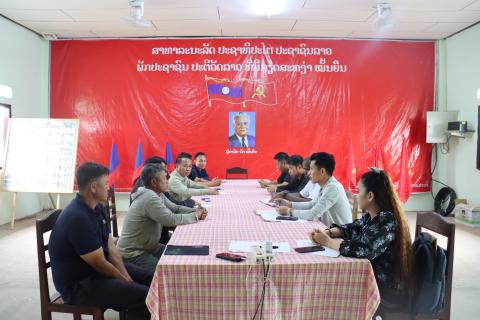
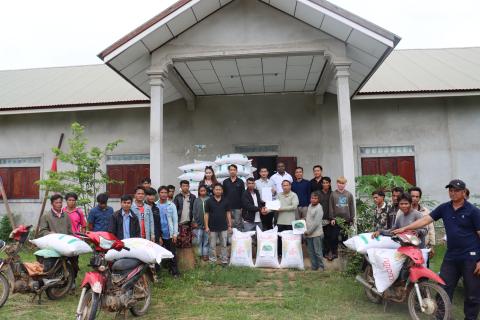
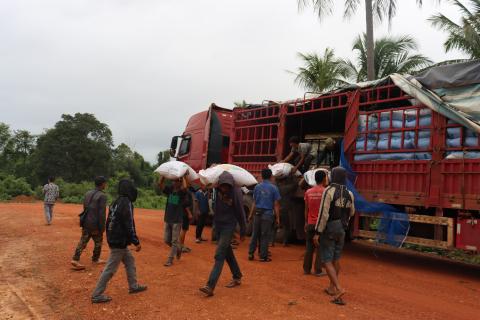
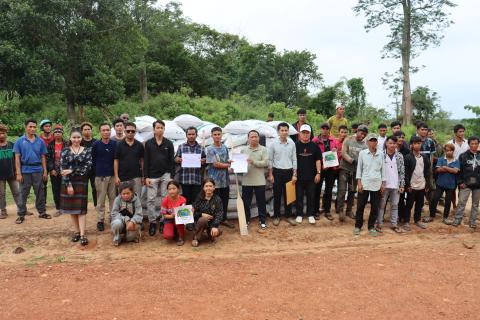
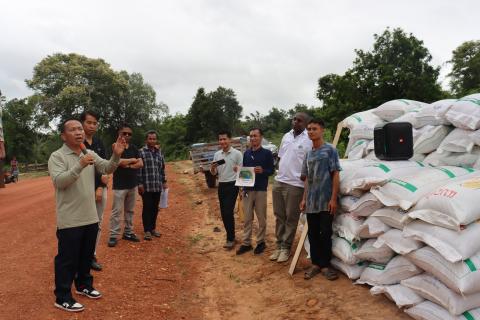
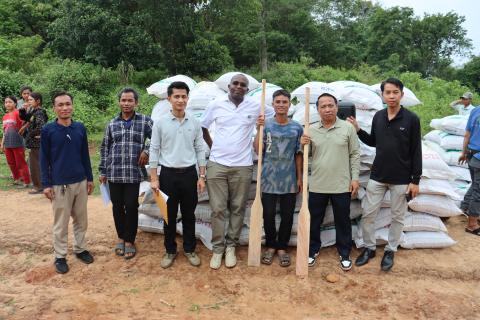
Strengthening Climate Resilience through Monitoring, Evaluation, and Livelihood Support in Savannakhet
Project Location
Saveu village, KeangHuapa and KeangThamae Village, TangAlaiNeua Village, Nong and Xepone District, Savannakhet Province
Project Description
The Integrated Water Resources Management and Ecosystem-Based Adaptation (IWRM-EbA) Project is implemented nationally by the Department of Water Resources (DWR) under the Ministry of Natural Resources and Environment (MONRE), with support from the United Nations Development Programme (UNDP) and funding from the Global Environment Facility (GEF). This initiative focuses on building climate resilience and promoting sustainable livelihoods in the Xe Bang Hieng River Basin and Luang Prabang City by integrating ecosystem-based approaches into water resource management and local planning.
From 26 May to 1 June 2025, the project team, in collaboration with provincial and district authorities, conducted a field Monitoring and Evaluation (M&E) mission across five target villages in Savannakhet Province. The visit aimed to assess the implementation of key project components, including climate-resilient livelihood activities, water infrastructure systems (such as solar-powered wells and drinking water filters), and Community Conservation Agreements (CCAs).
During this mission, the project also distributed climate-resilient rice seeds to villages that have actively participated in conservation efforts by signing and implementing CCAs. This support helps enhance food security and provides tangible incentives for local communities to engage in sustainable natural resource management. The IWRM-EbA project works to restore degraded ecosystems, promote responsible land and water use, and reduce the vulnerability of communities to climate change. It fosters institutional collaboration and supports knowledge sharing between stakeholders. Through nature-based solutions and active community participation, the project strengthens local capacity and embeds environmental and climate priorities into governance processes.
This activity contributes to the Lao PDR’s international commitments under the Paris Agreement, Sustainable Development Goals (SDGs), and its Nationally Determined Contributions (NDCs), especially in the areas of climate adaptation, environmental conservation, and rural development. By combining field monitoring with community-level support, the project ensures both transparency and impact supporting a resilient and sustainable future for Lao PDR.
From 26 May to 1 June 2025, the project team, in collaboration with provincial and district authorities, conducted a field Monitoring and Evaluation (M&E) mission across five target villages in Savannakhet Province. The visit aimed to assess the implementation of key project components, including climate-resilient livelihood activities, water infrastructure systems (such as solar-powered wells and drinking water filters), and Community Conservation Agreements (CCAs).
During this mission, the project also distributed climate-resilient rice seeds to villages that have actively participated in conservation efforts by signing and implementing CCAs. This support helps enhance food security and provides tangible incentives for local communities to engage in sustainable natural resource management. The IWRM-EbA project works to restore degraded ecosystems, promote responsible land and water use, and reduce the vulnerability of communities to climate change. It fosters institutional collaboration and supports knowledge sharing between stakeholders. Through nature-based solutions and active community participation, the project strengthens local capacity and embeds environmental and climate priorities into governance processes.
This activity contributes to the Lao PDR’s international commitments under the Paris Agreement, Sustainable Development Goals (SDGs), and its Nationally Determined Contributions (NDCs), especially in the areas of climate adaptation, environmental conservation, and rural development. By combining field monitoring with community-level support, the project ensures both transparency and impact supporting a resilient and sustainable future for Lao PDR.
Project Outcomes & Impacts
From 26 May to 1 June 2025, the Department of Water Resources (DWR), Ministry of Natural Resources and Environment (MONRE), in collaboration with UNDP and key local stakeholders, conducted a Monitoring and Evaluation (M&E) mission across targeted districts in Savannakhet Province as part of the Integrated Water Resource Management and Ecosystem-based Adaptation (IWRM-EbA) Project.
🔍 The M&E visit aimed to:
✅ Assess climate-resilient livelihood activities
✅ Review community use of water infrastructure (e.g., groundwater well, solar pumps, filters)
✅ Monitor implementation of Community Conservation Agreements (CCAs)
✅ Engage with community members and local authorities for feedback and lessons learned
🤝 On the same day, we were proud to support sustainable agriculture by providing climate-resilient rice seeds to communities that signed CCAs. This effort is part of our commitment to building resilient and adaptive livelihoods in the face of climate change.
📸 Together, we are working toward a more resilient, water resources-secure future for communities. 🌱🌍
🔍 The M&E visit aimed to:
✅ Assess climate-resilient livelihood activities
✅ Review community use of water infrastructure (e.g., groundwater well, solar pumps, filters)
✅ Monitor implementation of Community Conservation Agreements (CCAs)
✅ Engage with community members and local authorities for feedback and lessons learned
🤝 On the same day, we were proud to support sustainable agriculture by providing climate-resilient rice seeds to communities that signed CCAs. This effort is part of our commitment to building resilient and adaptive livelihoods in the face of climate change.
📸 Together, we are working toward a more resilient, water resources-secure future for communities. 🌱🌍
Project Media & Reports
Image

Image

Image

Image
Image
Image
Image
Image
Image
